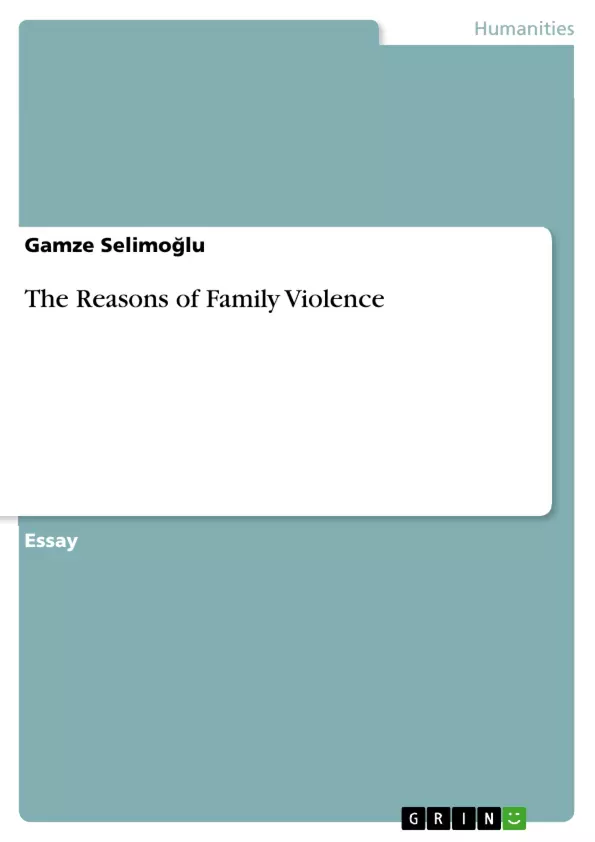Historically, women have always been the main victim of domestic violence. The battered women’s movement shows that patriarchy is privilege in our society which held that the husband as master of the household had unquestionable authority to discipline his wife and children.This paper will analyze the background of family violence, the reasons of domestic violence and the effects of cultural factors on it.
Inhaltsverzeichnis (Table of Contents)
- The Reasons of Family Violence
- Childhood Violence
- Loss of Control
- Control by Force
- Cultural Factors
- Cultural Influences on Domestic Violence
- Traditional Values and Gender Roles
- Patriarchal Theories
- Empowerment and Violence
Zielsetzung und Themenschwerpunkte (Objectives and Key Themes)
This paper aims to analyze the background and reasons behind family violence, examining the impact of cultural factors on its occurrence.
- The Role of Childhood Violence and Its Correlation with Adult Victimization
- The Impact of Power Dynamics and Control on Domestic Violence
- The Influence of Traditional Values and Patriarchal Structures on Family Violence
- The Relationship between Culture and Domestic Violence
- The Role of Empowerment in Combating Domestic Violence
Zusammenfassung der Kapitel (Chapter Summaries)
The paper begins by discussing the historical context of family violence, highlighting how patriarchal societies have traditionally legitimized male authority over women. It then explores the connection between experiencing violence in childhood and the likelihood of becoming a victim or perpetrator of violence in adulthood. The author argues that a key factor in family violence is the desire to control, with perpetrators often attributing their actions to a perceived loss of control.
Further, the paper investigates the role of cultural factors in perpetuating domestic violence, focusing on traditional values that reinforce male dominance and financial control within families. The author discusses the connection between these values and the prevalence of abuse against women and children.
The paper examines different theories, including the patriarchy theory, which suggests that societal structures that empower men over women contribute to the perpetuation of domestic violence. It also explores the relationship between empowerment and violence, highlighting how societies with lower levels of female empowerment often experience higher rates of intimate partner violence.
Schlüsselwörter (Keywords)
The paper focuses on the complex issue of family violence, examining factors such as childhood violence, power dynamics, control, cultural influences, traditional values, patriarchal structures, and empowerment as they relate to the occurrence and perpetuation of domestic violence.
Frequently Asked Questions
What are the primary objectives of this paper on family violence?
The paper aims to analyze the background and reasons behind family violence, specifically examining how cultural factors, power dynamics, and traditional patriarchal structures influence its occurrence.
How does childhood violence correlate with domestic abuse in adulthood?
The research explores the connection between experiencing or witnessing violence during childhood and the increased likelihood of becoming either a victim or a perpetrator of violence in adult relationships.
What role does the desire for control play in family violence?
The author argues that a central factor in family violence is the perpetrator's desire for control. Abuse often occurs when a perpetrator perceives a loss of control and uses force to re-establish dominance.
What is the patriarchy theory mentioned in the study?
The patriarchy theory suggests that societal structures privileging men over women contribute to domestic violence by legitimizing male authority and the discipline of wives and children.
How does female empowerment relate to rates of intimate partner violence?
The paper highlights that societies with lower levels of female empowerment—often characterized by restricted financial control and traditional gender roles—tend to experience higher rates of intimate partner violence.
- Citation du texte
- Gamze Selimoğlu (Auteur), 2011, The Reasons of Family Violence, Munich, GRIN Verlag, https://www.grin.com/document/190557



